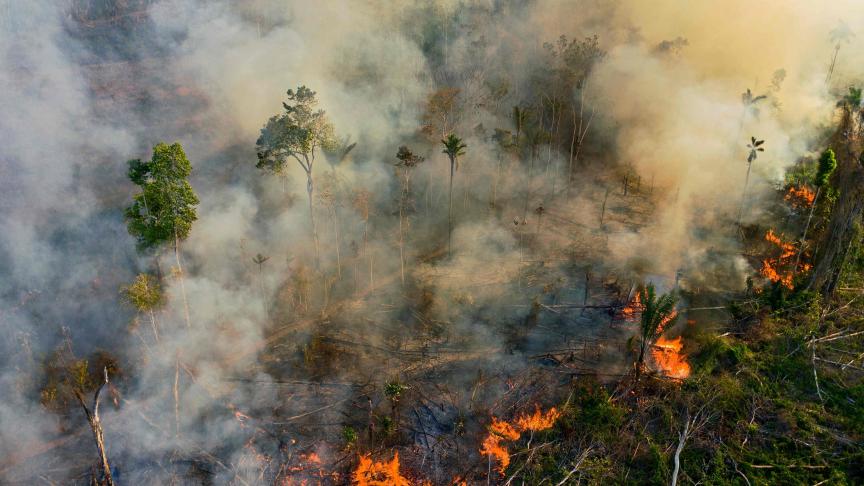The number of fires in the Brazilian Amazon hit a 15-year high in August, with more than 3,300 fires burning in one day. The tally for the entire month is the highest since 2010, surpassing the August 2019 wildfires that drew global attention.
Brazil’s ‘fire season’ - when farmers burn off felled vegetation - comes as deforestation in the Brazilian Amazon looks set to also reach a 15-year high. During the first six months of 2022, nearly 4,000km2 of the Amazon was deforested.
The government of Jair Bolsonaro, supported by the country’s vast agri-business sector, bears responsibility for this surge of destruction. Under Bolsonaro’s premiership, environmental enforcement agencies have had their budgets reduced and powers restricted, and the system for handing out environmental fines has been obstructed. This has emboldened land grabbers.
Brazil’s desire to continue converting the Amazon and the Cerrado - a vast tropical savannah the size of England, France, Germany, Italy and Spain combined - into farmland and pasture is also very likely behind the government’s recent attempts to derail ongoing UN negotiations aimed at securing a global agreement to halt and reverse biodiversity loss.
It is of course essential for Brazil’s government to act to protect the Amazon and the Cerrado. Both are globally important ecosystems, containing 15% of the world’s biodiversity and playing pivotal roles in local and global climate regulation. Both provide a wide range of forest-derived resources, from food to medicines. Both are home to vulnerable communities that suffer the immediate and severe effects of land grabbing and deforestation.
But this is only half the picture. Effective action will only be possible if greater recognition is given to the direct role richer countries play in driving deforestation and conversion in emerging economies like Brazil through unsustainable consumption.
Studies reveal G7 countries to have significant deforestation footprints outside of their own countries, with an average loss of nearly four trees per person each year. The average ecological footprint for a US citizen is nearly three times that of a person in Brazil and eight times that of a Kenyan. Our food systems drive deforestation and conversion of natural ecosystems while contributing around 29% of all greenhouse gas emissions.
The increasing demand for commodities from markets like China and Europe is helping fuel the expansion of agricultural and pasture lands on native vegetation in Brazil, often occurring over indigenous and traditional communities with poor land rights. Today, the country is the major producer and exporter of soybean and beef, all the while using highly-hazardous chemical pesticides that have been banned in the EU.
The increasing demand from abroad does not absolve Brazil of responsibility, but it does make a compelling case for developed countries to provide greater financial support to the biodiversity protection efforts of developing countries, while aiding a transition to a nature-positive model of production that leaves no one behind. Urgent steps must also be taken to improve transparency of farming supply chains, and redirect subsidies harmful to nature towards sustainable production.
With the European Parliament due to vote next week on a new EU deforestation law, Europe has an opportunity to lead the way by adopting strong legislation to stop deforestation and ecosystem conversion as well as related human rights violations caused by EU consumption of beef, soy, palm oil and other commodities.
While public pressure to adopt a strong law is high, concerningly, the draft law’s current wording does not include ecosystems like the Cerrado. This inconsistency risks further unnecessary agricultural expansion - unnecessary because Brazil has 66 million hectares of degraded pasture land that can be converted to agricultural uses, provided the right regulatory environment and financial support are in place.
Likewise, on finance, Europe has started to signal that it is ready to lead, with the European Commission last year doubling its biodiversity funding for the most vulnerable countries. Others, like Canada, are also stepping up. However, with the biodiversity funding gap estimated at $700 billion annually, it's simply not enough.
World leaders are scheduled to meet in New York next week for the 77th United Nations General Assembly. They must ensure action on biodiversity loss is high on the agenda, ahead of the 15th Conference of Parties for the Convention of Biological Diversity (CBD COP15) in December. Encouragingly, countries that have endorsed the Leaders’ Pledge for Nature are expected to announce new financial commitments to help reverse biodiversity loss.
These commitments will be vital to demonstrate leadership and forge common ground ahead of COP15. But more is needed. Increasing finance for biodiversity is key to securing an ambitious agreement capable of delivering a nature-positive world by 2030 for all.
If Western countries are serious about protecting the Amazon and the Cerrado – and they should be – they must step up and shoulder their responsibility for protecting these unique and priceless ecosystems. A priority for Brazil is economic development, but this can be done in ways that benefit people without driving deforestation and conversion. The West can help through financial and technical support – but the time to act is now.


